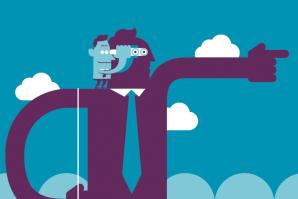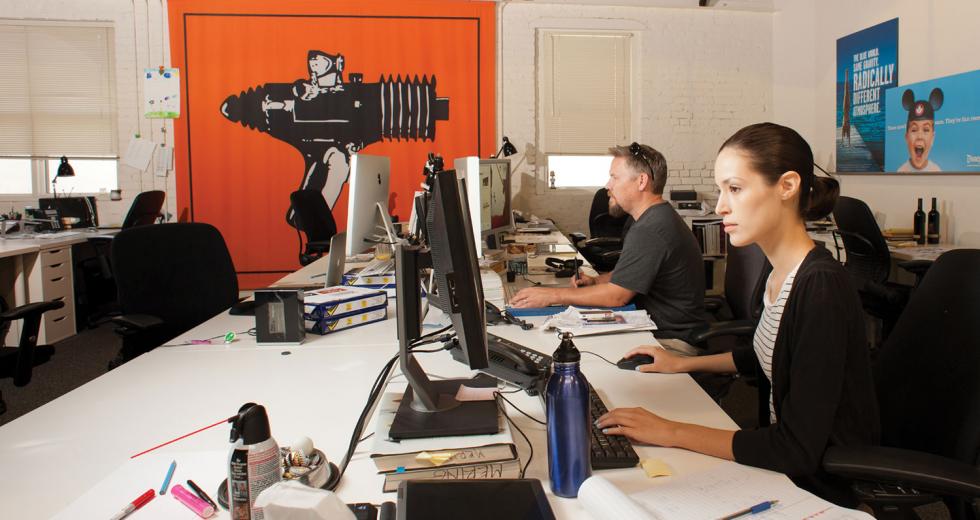It is 2 p.m. on a Friday, and a techno beat pulses through speakers resting above two cubicles. On a desk are four pizzas, three bags of bread sticks and an opened liter of Mountain Dew.
The music and food are there to fuel six young men at Concordus Applications Inc., a Sacramento-based software company, who have set out to develop an entire computer program in this single afternoon using a code they learned a few hours earlier. Today is a hack day, a marathon work session fueled by caffeine and camaraderie, where staff save time and money by cramming weeks worth of creative development into a single sitting.
“On a hack day, we can work on anything. You could learn a whole new language you would not have had otherwise. So we are actually giving (the employees) mastery in other areas as well and creating a more well-rounded development team,” says Ken Anderson, chief technology officer at Concordus.
All-nighter work sessions have existed since the creation of deadlines, but more organized endurance competitions known as hack days or hack-a-thons grew out of the tech boom of the late 1990s. The events, which are broadly defined as focused work periods wherein one team or several teams complete specified tasks in a set amount of time, now span several creative industries, including advertising and design. In recent months, hack days have emerged in the Capital Region as employers and employees have come to view them as a team-building exercise that cuts costs.
“I like the competition and camaraderie. We do training activities that reward you with points and badges, so it is a bit of a competition between us,” says James Miles, an intern at Concordus.
“But also there is a lot of cooperation,” he adds. “If you have a problem, people are more than happy to answer your questions.”
Concordus hosts a hack day every four to six weeks. Anderson came up with his version a few years ago. His former sales job hosted training days in which employees stopped their regular phone calls to learn new sales techniques, but Anderson felt the tasks were too structured. Concordus Applications’ hack days are split between instruction time and hands-on application to either build new software or check security on current software. Integrating many different outlooks in a fun and more collaborative environment sparks creativity and empowers employees, Anderson says.
“When you get the line-level people … involved in that brainstorming process, involved in the solutions process, you come up with a lot of stuff you wouldn’t normally come up with because they have a different perspective,” he says.
Hack days can be modified to meet the needs of different types of companies. App Matrix, a Roseville-based mobile software company, hosts monthly eight- to 30-hour competitions between teams to see who can design the best components for apps under development. Tim Dement, the company’s co-founder, explains that each team may come up with a different solution or a slightly different app structure. The company will sometimes combine the best parts of each team’s software for the final product.
“The hack-a-thon has allowed our team to become strong, know who is the strongest one, know who is the weakest one, who needs the help, and it has grown the team,” he says. “Our collaboration levels are so high now.”
Hack days can also be used to develop side projects that are too time-consuming to fit inside the normal workweek. Last year, MeringCarson, a Sacramento marketing and advertising agency, participated in a national CreateAthon event and spent one day designing marketing and fundraising campaigns pro bono for local nonprofits. MeringCarson co-owner Greg Carson explains that having a set hack day for all the ancillary work helped his colleagues plan and prioritize.
“(It) really gave us a way to know in the future how to help people,” he says.
The four teams included employees from both the companies’ business and creative departments. While some employees said they experienced a little panic to finish in 24 hours, especially in the early morning, all the projects were completed by the time the clients came the next day.
“It was down to the wire, and we really saw all we were made of,” says Kachet Jackson-Henderson, a project manager. “I think we surprised ourselves with how much we could produce in such a short period of time.”
Pulling an all-nighter work event requires planning to ensure projects are completed on time and account for extra costs. Those costs might include lost regular workdays for the event and while workers recover afterwards, additional on-site personnel, bonus wages and catering food and drinks.
Concordus Applications pays its six employees only during business hours, and some employees did not participate in the nighttime portion of the hack day. Anderson plans the classroom portion of the day but allows employees to organize themselves and decide on the tasks to complete. Meanwhile, App Matrix spends at least 10 days planning and invests up to $10,000 to pay for overtime, prizes and catered food — though Dement says he earns it all back plus thousands more by reducing overall production time. The events require coordination throughout, so he will spend extra time to be at the event.
“If it is overnight or into the early hours, I will stay with them, just to make sure you don’t lose an employee out of it,” Dement says, adding that managers check in to keep tabs on progress every four hours.
Companies generally set time aside after the event to allow workers and managers to recuperate. Concordus Applications holds hack days on Fridays, so they have the weekend to rest. MeringCarson had its CreateAthon on a Thursday and gave its employees the next day off. App Matrix holds hack-a-thons on Wednesdays and Thursdays, so employees who participate get a four-day weekend. Even with all the fatigue and planning, the companies all report positive changes and team growth.
“Every single one of our hack-a-thons, our guys come out motivated and loaded, and they are ready to go,” says Dement. “They’ve learned, had a great time and win cool stuff. It’s like an energetic revival.”
Recommended For You

The Quick Quit
Employee retention hinges on a smooth onboarding process
Have you ever arrived at work and realized you don’t remember driving there? It’s kind of a weird feeling, but your consciousness was somewhere else while your subconscious did all the work of traveling, turning, merging and parking. You can do this because your commute is so ingrained that it doesn’t involve any real decision-making.



